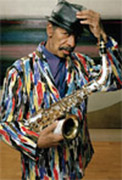Ornette Coleman: Still Free After All These Years (Relix Revisited)
As we reported yesterday, over the weekend, two jazz icons collaborated for what may well have been the first time, when Sonny Rollins was joined at his 80th birthday celebration by fellow octogenerian Ornette Coleman. To make the occasion we look back on our October 2006 interview with Coleman.

Photo by Jimmy Katz
Ornette Coleman has been turning heads ever since the release of his landmark album, The Shape of Jazz to Come,in 1959. He followed that up with yet another definitive, genre-defining album a year later, Free Jazz: A Collective Improvisation. Since then, Coleman hasn’t looked back in his quest to break down musical barriers, redefine band dynamics and continually explore the sonic space of improvisation. Heaps of albums and collaborations later – Charlie Haden, Don Cherry, Scott LaFaro, Freddie Hubbard, Billy Higgins, Elvin Jones, Eric Dolphy, Dewey Redman, and Pat Metheny among them – not to mention a MacArthur “Genius” Award, Coleman still squanks like he was a young cat of yesteryear, taking listeners on a journey not soon forgotten.
Sound Grammaris the first album for your own label of the same name, your first new recording in a decade and your first live album in 20 years. Why now?
I consider myself a composer that performs. I spend most of my time trying to write music so my band won’t get bored.
You’ve rarely performed on other peoples’ records though relatively recently you appeared on Joe Henry’s Scarand Lou Reed’s The Raven. Why these two, non-jazz artists?
I just never have refused to do something to support a composer or singer. I think music is not at the level bankers are. I have a very sympathetic reason to want to support those that want to make their living in playing music.
You recorded with Jerry Garcia for Virgin Beautyin addition to sitting in parting with the Grateful Dead in 1993. How’d these collaborations come about?
I remember being in California; Jerry Garcia called me up. I went out and sat in with the Grateful Dead. For some reason they thought I did a pretty good job because they said, “Oh, come back.” The one thing that I’ve always been able to do is improvise in any form of changes of melody.
You traveled to Africa in the mid ‘70s, spending time with rural musicians in both Morocco and Nigeria, playing traditional music. Yet when you returned, you went very electric. Why?
The natural sounds were always sounding more rhythmically. The electric sound was always sounding like, "That’s not the right note but keep doing it, It was like that. To me it’s still like that. In other words – I’m going to say something and it’s going to sound vulgar – but I don’t mean it to sound like that: When you’re having sex, what are you having it for?
For pleasure or to experience a deeper connection with someone?
Okay, fine. But at the same time you already know what you’re going to go through to get wherever you’re trying to go. But in sound, it seems, it doesn’t travel. It goes into an abyss. It doesn’t have anything that it’s indebted to yet at the same time it can warm you, it can speak as if it had a language.
At 76, you’re one of the last true jazz innovators. How do you feel?
Musically, I really have found and developed a true human condition that will allow me to go and play in any musical environment without being booed or beat up. There should be nothing on this planet that’s above someone else just for that to exist. I don’t know how long I or anyone is going to live. But the sky doesn’t have no roof, right? So if the sky has no roof, where is the roof we’re looking for? Why is it that whatever human beings are, that something has to control what you can’t do and what you want to do? Why does that exist?
I’m not sure, but at least your sounds will still exist because they’ve been captured and preserved.
Yeah. And peanut butter, too. [laughs]



















